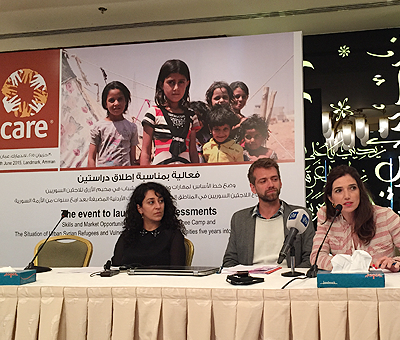CARE International in Jordan and Silatech have released an assessment outlining the opportunities available to youth in Azraq Refugee Camp to improve their livelihoods, as well as the types of skills they possess that could help them to do so. Conducted during May-June 2015, the “Baseline Assessment of Skills and Market Opportunities for Youth in Azraq Refugee Camp” is based on more than 200 individual and household interviews, and focus group discussions with more than 100 participants in Jordan’s Azraq Camp.
The assessment found that demand for work among Azraq Camp residents is very high, and recommended specific steps to address the demand.
Azraq Camp currently hosts over 19,000 Syrian refugees, over half of whom are children below the age of 18, while around 45% are of working age (18-59 years). The assessment found that there is great need for work in the Camp. Many are skilled, or could develop skills, and are hungry to build a better life for themselves. Moreover, residents of Azraq Camp need money to cover their most urgent needs, as they rely heavily on a monthly cash allowance of only 20 JOD per person. This very small amount is provided for purchasing food through the World Food Program (WFP) food distribution point at Sameh Mall, which is the only place in the camp that sells any kind of goods.
The assessment finds that Camp inhabitants possess a variety of potentially useful skills, including trading, farming, carpentry, food production, teaching and hairdressing, and recommends finding opportunities for refugees to use the skills that they have. One recommendation in this regard is to open a marketplace in Azraq Camp. Currently, the only place in Azraq Camp that sells any kind of goods is Sameh Mall. The opening of a market would provide Camp population with numerous opportunities for income, as well as improve their quality of life simply by making more products and services readily available.
Fairuz Taqi-Eddin, Silatech’s Director of Country Operations, says “Markets bring life and livelihood opportunities to any setting. The much-anticipated market in Azraq camp will support the creation of enterprises. Silatech’s work in the enterprise space has proven to us the positive change that enterprises can bring to the economic status of individuals and families, while creating job opportunities for others.”
Silatech is a regional social initiative which works to improve employment and entrepreneurship opportunities for young people throughout the Arab world.
The study also includes an in-depth review of the Azraq Camp livelihood program, known as the Incentive-based Volunteering (IBV) scheme. The IBV scheme is the only mechanism in Azraq Camp to register job-seekers, facilitate recruitment and track the status of their placement in IBV opportunities.
“This livelihoods program is a major step in creating opportunities where refugees can offer their skills or develop new ones. Meanwhile, NGOs benefit from the experience of Syrian refugees. The IBV scheme has injected more than USD 1 million into the camp economy,” says Salam Kanaan, CARE Jordan Country Director.
The success of this livelihood effort has relied upon coordination between Jordan’s Syria Refugees Affairs Directorate (SRAD), UNHCR, CARE and other NGOs, organizing placement, rotation, and reporting. “The impact has been significant for those who participate, but the volunteer opportunities fall short of absorbing the supply of Syrians willing and able to contribute,” Kanaan says.
The report also found that women face several obstacles to participating in the local economy, including household duties, child care, and proximity to work places.
“Opportunities to work in the home, or closer to home would make it easier for a woman to contribute financially, build her skills, and ensure a better future for her family,” adds Kanaan.

